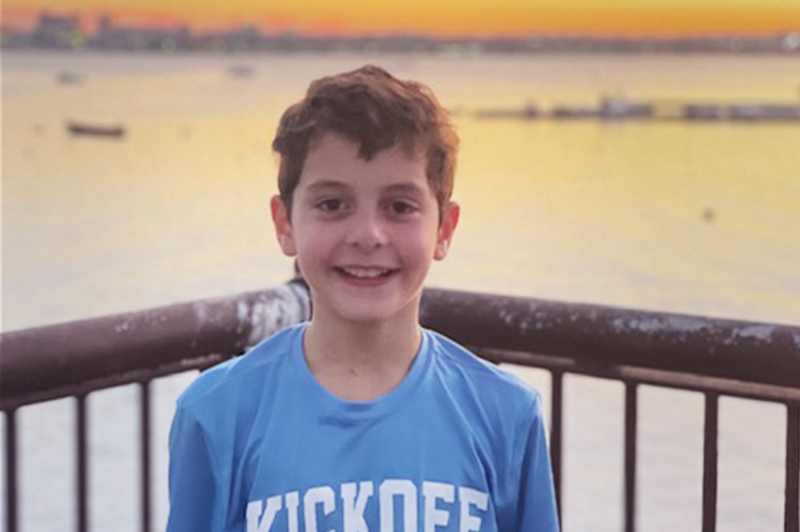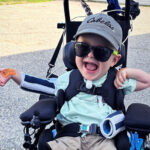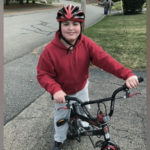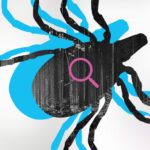‘A lot better now’: Andrew’s recovery from Rocky Mountain spotted fever and a stroke

When Andrew was bitten by a tick in 2021, he and his parents could hardly have imagined that just a month later, he would be coping with a series of health problems that would culminate in a stroke. Andrew, then 7, didn’t even realize he’d been bitten until he began to feel sick with a fever, headaches, and “spots all over my body,” he says.
At first, his pediatrician — and then emergency room staff — thought he simply had a virus. But when his symptoms got worse, a second trip to Boston Children’s Emergency Department finally yielded some answers.
Blood tests confirmed what Andrew’s mother, Elizabeth, suspected based on her internet searches: Andrew had Rocky Mountain spotted fever (RMSF), a type of infection caused by bacteria carried by ticks that’s relatively rare in Massachusetts. RMSF usually affects children and, despite its name, can occur anywhere in the U.S. Although Elizabeth had a cousin who experienced complications of RMSF years earlier, “We live in Boston and didn’t really worry about ticks,” she says.
More worrisome symptoms — and a new complication
Andrew was prescribed a course of antibiotics and spent three days at Boston Children’s before returning home to recover. But a month later, he started experiencing other worrisome symptoms. Although Andrew was prone to motion sickness, he began vomiting more frequently and when he wasn’t in the car. His headaches became so severe that they woke him up during the night.
“We went back to the ER,” says Elizabeth. This time, Andrew saw neurologist Dr. Mark Gorman, who directs Boston Children’s Neuroimmunology Center. Based on Andrew’s symptoms, he ordered an MRI scan, which revealed a new complication: Andrew had experienced a stroke.
If not treated promptly, RMSF can make blood vessels in the brain swell, causing small vessel vasculitis, which in turn can lead to a stroke. Andrew was again admitted to the hospital. There, he was treated with more antibiotics and steroids, as well as an IVIG (immunoglobulin) infusion. Dr. Gorman also referred Andrew to his colleague, neurologist and neuroinfectious disease specialist Dr. Molly Wilson-Murphy.
“She was so empathetic and helpful,” says Elizabeth. “We also really appreciated that she has experience with RMSF, which not all doctors are as familiar with.”
A great resource
Three years later, Andrew has graduated from his care in the Stroke and Cerebrovascular Center but still sees Dr. Wilson-Murphy twice a year — a relationship for which he and his family remain grateful.
“I think we have a little bit of PTSD from Andrew’s experience and tend to worry when he has a headache or feels nauseous,” says Elizabeth. “Dr. Wilson-Murphy listens to our concerns and gives us peace of mind. She’s been a great resource for us.”
She’s also given Andrew ways to unwind at night — a tough time of day for him after his stroke — without medication. Likewise, Kitty Petty, the Center’s education specialist, has supported the family in working with Andrew’s school, helping his parents with a 504 plan that helps with any accommodations he needs.
“I’m feeling a lot better now,” says Andrew, who enjoys swimming, sailing, football, hockey, and playing video games like Fall Guys and Rocket League. And he’s got some advice for kids who might find themselves in a similar situation at the doctor’s office: “Relax, don’t be nervous — and don’t tense up when you get a shot.”
Learn more about the Neuroimmunology Center.
Related Posts :
-

After a severe case of myelitis, ‘rockstar’ Maxwell is on the move
When Maxwell Lazarz’s mother, Jennifer, tells him he’s a rockstar, he just laughs and asks her what that ...
-

Austin’s story: Raising awareness after treatment for pediatric stroke
In May, 11-year-old Austin Rizzo led the pack in a two-mile road race of his own creation. But the race, ...
-

The mystery of Jane’s left shoulder: Acute flaccid myelitis
When 5-year-old Jane Morehead tumbled off her bike in May 2017, it didn’t seem like a big deal. Jane’s ...
-

Q and A: What you need to know about ticks and Lyme disease
With summer on the way, you and your family will probably be spending more time outdoors. You may be taking ...





